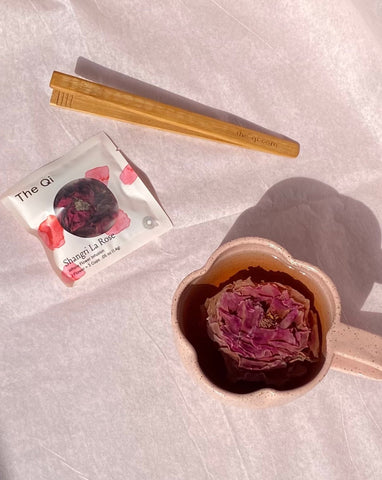The History and Delightful Journey of Rose Tea
For centuries, roses have captivated hearts with their enchanting beauty and mesmerizing fragrance. But did you know that these delicate flowers have also been cherished for their culinary and medicinal properties? Among the many ways roses have been used, rose tea holds a special place in history as a beverage that not only delights the senses but also offers a range of health benefits. Let's embark on a journey through time and explore the rich history of rose tea.

Origin and Ancient Uses:
The cultivation of roses dates back thousands of years, with evidence of their existence found in ancient civilizations such as Egypt, Persia (modern-day Iran), and China. In these cultures, roses were highly revered and held symbolic and medicinal significance. Ancient Egyptians used rose petals to make fragrant oils and perfumes, while the Persians and Chinese utilized them in culinary preparations and for their healing properties.

Rose Tea in China:
China has a profound association with roses and their use in tea. The practice of brewing rose tea can be traced back to the Tang Dynasty (618-907 AD), known as a golden age for Chinese poetry, arts, and culture. It was during this time that the Chinese began infusing dried rose petals with green tea, black tea, or herbal blends, creating a delightful and fragrant beverage.
Rose tea gained popularity not only for its taste but also for its therapeutic effects. Traditional Chinese medicine recognized rose tea as a cooling and calming drink that could help balance the body's energy, promote healthy digestion, and relieve emotional stress and anxiety. It was also believed to enhance beauty and promote youthful skin.
Rose Tea in the Middle East and Europe:
The allure of rose tea spread beyond China and made its way to the Middle East and Europe. In Persia, rose water and rose petals were used to flavor various dishes, including sweets and beverages. The aromatic essence of roses became an integral part of Persian cuisine and culture.
In Europe, rose tea gained popularity during the Renaissance period when roses were considered a symbol of luxury and prosperity. It was customary for noble households to serve rose-infused teas to guests, offering a refined and fragrant experience. The popularity of rose tea continued to grow, with different regions incorporating their own unique twists, such as adding spices or herbs to enhance the flavor.
Modern-Day Rose Tea:
Today, rose tea continues to be cherished worldwide for its soothing aroma, delicate flavor, and potential health benefits. It is often made by steeping dried whole rose flowers or rose petals in hot water, allowing the fragrant essence to infuse into the liquid. Rose tea can be enjoyed on its own or blended with other teas or herbal ingredients to create delightful and aromatic blends.
Health Benefits of Rose Tea:
Apart from its enticing taste and aroma, rose tea is known for its potential health benefits. It is believed to possess anti-inflammatory and antioxidant properties, which can help combat oxidative stress, promote healthy skin, and support the immune system. Rose tea is also considered a natural diuretic and is sometimes used to relieve menstrual cramps and support urinary tract health.
In addition, the calming properties of rose tea can help relax the mind, reduce anxiety, and promote restful sleep. Its gentle and soothing nature makes it a popular choice for those seeking moments of tranquility and self-care.
A Timeless Elixir:
From its ancient roots in China to its influence on Persian and European cultures, rose tea has traversed time, transcending borders and captivating generations with its beauty and benefits. Its delicate fragrance and elegant flavor continue to enthrall tea enthusiasts, offering a delightful and therapeutic experience that connects us to the rich tapestry of history.
So, the next time you sip on a cup of rose tea, take a moment to appreciate the remarkable journey it has undertaken and the centuries of tradition and wisdom it
represents. Let the timeless elixir of rose tea transport you to a world of sensory delight and nourish your body, mind, and soul.





















